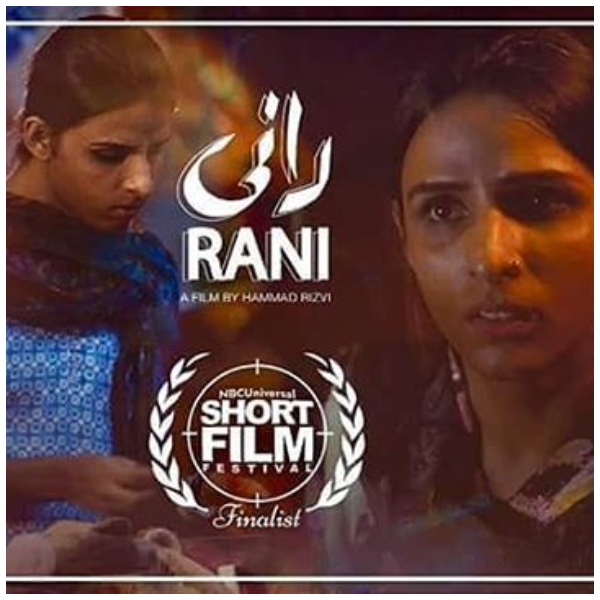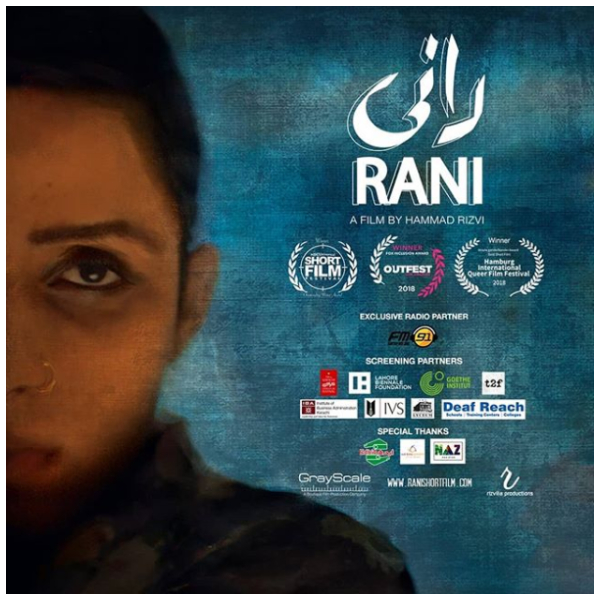Two films were screened on the third day (Sunday) of the 10th Karachi Literature Festival at Beach Luxury Hotel. One of these was a transgender woman’s story Rani. Having won many international accolades, the film was premiered for the Pakistani audience for the first time.
Directed by Hammad Rizvi, Rani is a short film which highlights the desire of a transwoman to be a mother. Featuring transgender activist Kami Sid as a debutant actor, the story sheds light on how she wants to lead a normal life by earning bread and butter through means of selling toys for children. The film takes an interesting turn when we see Rani passing by the Edhi Foundation cot where women leave behind newborns whom they cannot fend for.
Kami who is seen playing the titular role in the film expresses a desire to raise the child she finds in the cot and takes it home. Her friend Neela aapa — played by Hina who belongs to the transgender community in Karachi — rejects the idea of raising a child as she fears people will make their lives more miserable, questioning where the child came from. However, after Rani’s constant insistence, they reach a conclusion to raise the child.
Read: Kami Sid’s Rani will have its Pakistani premiere in MarchÂ
The director has articulately juxtaposed two taboos in our society; a transgender’s desire to raise a child who has been abandoned by her own mother. Exploring two realities of our society, the filmmaker revealed the inspiration behind this film. “At a red light, you see two people; you see children who are unfortunately begging on the streets and you see transwoman. So, I thought there has got to be a connection between the two and that is where the inspiration for this film came from.”

Kami is shown as a transwoman who is undeterred by the condescending tones of people and walks with her head high. She is unapologetic for her decisions and doesn’t care about ‘loug kya kahenge‘. But, reality soon seeps in when one night she is attacked by men who are forcing themselves upon her without her consent just because she is a transwoman.
The incident, though leaves Kami wounded physically and emotionally also becomes a reason for hope. When she reaches the Edhi Centre to return the baby with all her belongings, she is offered a job as a caretaker for the babies. Speaking about her experience at the screening of the film Kami said; “When I started doing this film, as an activist, I was wondering if I should do this or not because it comes with a lot of responsibility. Through this film, I realized what motherhood feels like. In fact, even if you are not a mother, the feeling of raising a child was instilled in me and I am sure all the mothers in the audience can relate to it. So, this film is not only for the transgender community but also for single mothers who face difficulties.”

The filmmaker concluded that although the conclusion of the film could’ve easily been sappy, they deliberately aimed for a hopeful ending. “The ending could have easily gone the other way with a sad ending and we could just say that ‘Oh, but that’s the reality’ but I believe everyday men and women bring about change (not leaders) and through the hopeful ending of this film, we have tried to create an understanding and hope for the oppressed communities that maybe we should start thinking differently about them.”
Though Kami might not excel as an actor, it was her story to tell and she does the job beautifully. Rani is the first transgender film which shows the community in a better light than their cliched portrayals.





